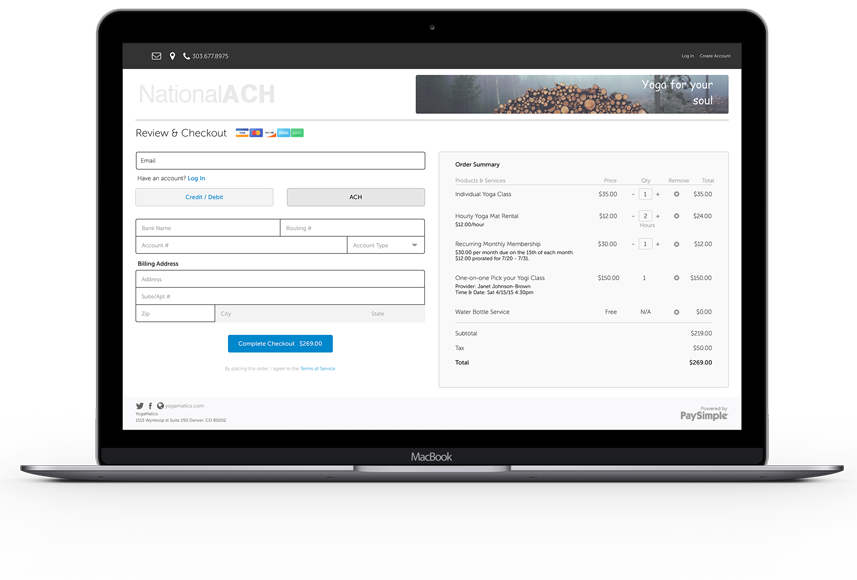Electronic Checks Frequently Asked Questions
Frequently Asked Questions
This article address the most commonly asked questions about ACH electronic check processing. If you are thinking of setting up an echeck account, this article will be helpful to you.
What is an electronic check?
An electronic check is an form of payment whereby the money is transferred electronically from a buyer’s bank account to the seller’s bank account. These transactions are called electronic checks because the merchant or biller uses a check as a source document for the consumer’s account information (RCK, POP, ARC) or the consumer is prompted to use their check as a reference to provide their account information (WEB, TEL).
What types of transactions do electronic transactions include?
- WEB (Internet based)
- ARC (mailed payment check conversion)
- POP (check conversion-POS)
- RCK (NSF check recovery)
- TEL (telephone)
- PPD (consumer pre auth recurring one-time debit)
Is electronic check processing a new service?
Electronic checks have been used as a payment option for years. All types of businesses offer electronic checks to increase sales, improve cash flow, and give customers a convenient method of making payments
Can Internet and MOTO (mail order/telephone) merchants accept echecks?
Yes. Electronic checks can be offered as payment option for any type of transaction for all types of merchants.
Will electronic checks save merchants money?
Yes. Merchants offering electronic checks as a payment option save money by decreasing operating costs, bank fees, return check collections costs and credit card fees.
How do the costs for processing echecks compare with credit card processing?
Electronic checks save merchants 50-90% over credit card transactions. Most businesses pay a low flat-rate per transaction for electronic checks. Credit cards charge a discount rate plus a transaction fee.
How quickly will the merchant receive settlement of funds?
Settlement of funds depends upon the electronic check processing.. For Check 21 electronic checks, settlement is generally next business day. For ACH processing settlement is within 2-4 business days
What training will be needed for customer service agents?
No special training is needed. Electronic checks are accepted in the same way as credit cards. The only difference is that bank routing and account numbers are entered rather than credit card information.
Can echecks be used for international charges?
Presently, echecks are available only in the U.S. and Canada. Other options can be used for international payments.
Can consumers “chargeback” purchases like they can do with credit cards?
Contingent liability for chargebacks is much lower for electronic check transactions than with credit cards. With credit card transactions a consumer has 6 months (180 days) to charge back a credit card transaction.
For ACH electronic check transactions, a consumer has 60 days from purchase date to chargeback.. Check 21 electronic check transaction chargeback period is 40 days. Business to business echecks have a 3 day chargeback periods.
Can the merchant’s bank can provide electronic checks as a payment option for internet/MOTO merchants.
Most banks do not provide electronic check services for internet / MOTO merchants.
Where will an Internet check transaction appear on the consumer’s bank statement?
For electronic checks processing with Check 21, a complete description of the transaction is included in the area where checks are listed. For ACH electronic check processing, the transaction appears as a line item in the same area as payments such as direct payroll deposits and ATM transactions, are listed.
Is this process regulated and safe for consumers?
Companies that process payments electronically (electronic checks, credit cards, ATMs) must adhere to government-mandated guidelines. The electronic process is governed under Regulation E, which governs all electronic processing, including ATM and credit card transactions. ACH electronic checks are governed by NACHA rules. Check 21 electronic checks are governed by UCC and long-established check regulations.
How is a rejected transaction handled?
Merchants have full online reporting and can track the details of all transactions. Rejected transactions can clearly be seen in the reporting details. The report contains all the information necessary to identify the returns so that you can decide whether to contact the consumer directly to follow-up.
Will the customer’s checking account be secure?
Yes, echecks are actually more secure for consumers than paper checks. Paper checks are handled by more people in the payment process before arriving at the bank.
Conclusion
This article addressed some of the most frequently asked questions about electronic checks.
Echecks are the most popular alternative payment method for US buyers. More than 30% of internet retailers accept checks online.
Are you interested in an echeck account?
Contact info@NationalACH.com today
